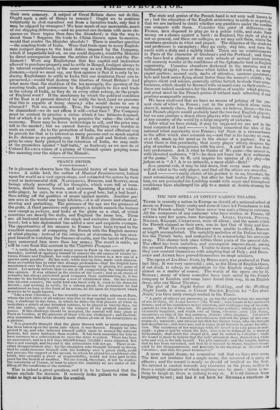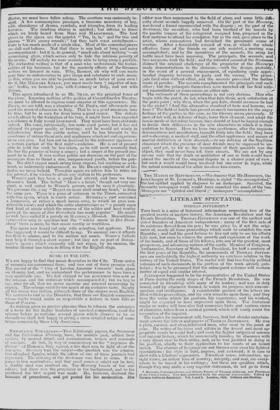THE NEW OPERA AT COVENT GARDEN THEATRE.
THERE is scarcely a nation in Europe so devoid of a national school of music as France. Their vanity and conceit have led Frenchmen to talk of " the French school," but there never was such a thing in existence. All the composers of any eminence who have written in France, till within a very few years, were foreigners. LULL!, GLITCH, P1CCIN!, NICOL°, SALIERI, CHERUBINI, were all aliens ; and the music which the French claimed as their own, was in fact that of Italy and Ger- many. What' HAYDN and MOZART were unable to effect, ROSSINI at length accomplished. The sprightly melodies of the Italian led cap- tive the French taste, and compelled it to acknowledge his sovereign sway. This change took place within three years of the present date. The effect has been imitation, and consequent improvement, among the present French composers. Unable to form a school of their own, they now content themselves with adopting that of Italy ; and BOIEL DIEU and AUBER have proved themselves no inapt scholars.
The opera of LesDeux Nuits, by BoIELDIEu, was produced at Paris last May. It was very successful ' • and, as the Muse of _English Opera, if not dead, is asleep, its adaptation to the English stage followed almost as a matter of course. The words of the opera are by M. SCRIBE ; many of whose comedies have been acted by the French company in London, and some have found their way, in an English dress, into our Minor Theatres.
The plot of the Night before the Wedding, and the Wedding Night (such, it seems, is Covent Garden Eng1ish for "Les Deus Nails,") is thus fairly enough recited in the Times.
" A party of officers are carousing in an inn the night before the marriage of one of them, Sir Lionel Lorimer (Mr. Wood) ; who boasts of his mistress's beauty, and of his confidence in her affection, and challenges any of his com- panions to win her if they can. Ile produces her portrait; which all agree is extremely beautiful, and which one of them, Valentine Acton (Mr. hem), recognizes as that of his lost mistress, Malrina (Miss Hughes). Vilentine's servant, Hector (Mr. J. Russell), undertakes to find out the place of her con- cealment; succeeds ; and informs her that her former lover, who she thought had deserted her, still loves her, and is ready at all hazards to prove his affec- tion. The ceremony of her marriage with Sir Lionel is to take place at mid- night : a plan is laid by which the lady, who is to be followed by a train of bridesmaids, shall enter the chapel first, and be united to Valentine ; while Sir Lionel is made to believe that the lady' attendant Rove, dressed in a. white robe and veil, is the lady herself. The plot succeeds; and the knight, finding that he has been outwitted, and that lie is himself to blame, becomes recon- ciled to his disappointment, and consents to the marriage of Mairina and Valentine; and thus the piece terminates."
A more insipid 'drama, we remember not that we have ever seen. The first act contains but a single scene, the carousal of a party of officers ; and the second is nearly as devoid of incident as the first. No interest is excited towards any character in the piece, neither is there a single situation of which anything can be made : there is no- thing to laugh at, there is nothing to cry at. It is all dulness from beginning to end ; and had it not been for Russah.'s exertions in Hector, we must have fallen asleep. The overture was ominously in- sipid. A few commonplace passages, a tiresome monotony of key, with abundance of drums, cymbals, and triangles, form its leading
features. The drinking chorus is spirited ; but inferior to those which we lately heard from RIES and MARSCHNER. The best pieces in the opera are the quartet " Tra, la, la," and the trio and chorus " With snowy wreath ;" but they both want curtailment— there is too much made of a single idea. Most of the concerted pieces arc dull and tedious. Not that there is any lack of busy and noisy accompaniment : but it is, in general, " much ado about nothing "—an unmeaning glare, which serves only to hide the intrinsic poverty of the music. Of melody we were scarcely able to bring away a particle. The orchestral writing is that of a man who understands the techni- calities of his business, but for the masterly effects of the German writers we listened in vain. Why, BISHOP, oh why will you waste your time in endeavouring to give shape and substance to such music as this, when you are able to produce so much better of your own ? Or if, like MICHAEL KELLY, you must needs turn 'S importer of mu- sic," traffic, we beseech you, with Germany or Italy, and not with France.
This opera introduced to us Mr. DEAN, as the principal tenor of the piece. Knowing nothing of the polities of Covent Garden Theatre, we must be allowed to express some surprise at this appearance. Mr. thetN, we are told, was a chorister at St. Paul's, and afterwards pur- sued his musical education in Italy. That lie is a good musician, may be true, but he is very far from being a good singer. The defects which attach to the formation of his tone, it might have been expected a residence in Italy would have cured. They must have been obstinate indeed. His voice, intrinsically, has some good points, but it has not attained its proper quality or bearing; and he would act wisely in withdrawing from the public notice, until he has brought to the assistance of nature those aids and appliances which art and experience alone can give. Let him not be deceived by the indiscreet applause of a certain portion of the first night's audience. He is not at present able to hold the rank he has taken, as he will most assuredly find. He has the promise of being a singer; but a singer at the present mo- ment he is riot. It was neither politic nor decorous on the part of the managers thus to thrust a raw, inexperienced youth, before the pub- lic. We ddn't expect much actingb from singers, but anything so awk- ward, so ludicrously embarrassed, as Mr. DEAN'S employment of his limbs, we never beheld. Therefore again we advise him to retire for the present, if he wishes to attain any station in his profession. Woon's part has been a good, deal altered, and here we trace
BISHOPS hand. The ballad " Here's a heart," though not very ori- ginal, is well suited to Woon's powers, and he sang it pleasingly. We presume the song " Regret no more shall rend my heart," is from
the same pen. There is a piece of criticism in the Times, connected with this opera, which is worth notice. RUSSELL'S part contained
a humorous, or rather a mock heroic song, to which he gave con- siderable effect ; and which the critic characterizes as " a parody upon that kind of music which the success of the wilder and least worthy
parts of the music of Der Freis.chutz has made popular." He might as well have called it a parody on HANDEL'S Messiah. Resemblance 1.etweyn the song in question and the " wilder music in Der ;Elvis- chatz" there is none, be that music worthy or worthless.
The opera was heard not only with attention, but applause. How this happened, it would be difficult to say. To musical ears it affords but little to admire, and to the million not much. Woou's ballads may help it through a short career ; but they are no part of BOIEL- DIE IT'S opera ; which assuredly will not repay, by its success, the trouble BISHOP has taken in fitting it for the English stage.



















 Previous page
Previous page